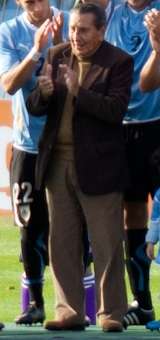Alcides Ghiggia
 Ghiggia in 2011 | |||
| Personal information | |||
|---|---|---|---|
| Full name | Alcides Edgardo Ghiggia Pereyra | ||
| Date of birth | 22 December 1926 | ||
| Place of birth | Montevideo, Uruguay | ||
| Date of death | 16 July 2015 (aged 88) | ||
| Place of death | Montevideo, Uruguay | ||
| Height | 1.69 m (5 ft 6 1⁄2 in) | ||
| Playing position | Winger | ||
| Senior career* | |||
| Years | Team | Apps | (Gls) |
| 1945–1948 | Sud América | ||
| 1948–1953 | Peñarol | 169 | (26) |
| 1953–1961 | Roma | 201 | (19) |
| 1961–1962 | Milan | 4 | (0) |
| 1962–1967 | Danubio | 128 | (12) |
| Total | 502 | (57) | |
| National team | |||
| 1950–1952[1] | Uruguay | 12 | (4) |
| 1957–1959[1] | Italy | 5 | (1) |
| Teams managed | |||
| 1980 | Peñarol | ||
|
* Senior club appearances and goals counted for the domestic league only. | |||
Alcides Edgardo Ghiggia Pereyra (pronounced [ˈɡiddʒa]; 22 December 1926 – 16 July 2015) was an Italian-Uruguayan football player, who played as a right winger. He achieved lasting fame for his decisive role in the final match of the 1950 World Cup.
Biography
He played for the national sides of both Uruguay and Italy during his career. He also played for the club sides of the Peñarol and Danubio in Uruguay and A.S. Roma and A.C. Milan in Italy.
Roberto Muylaert compares the black and white film of Ghigghia's cup winning goal in 1950 with Abraham Zapruder's chance images of the Kennedy assassination in Dallas. The goal and the shot that killed the US President have "the same dramatic pattern ... the same movement ... the same precision of an unstoppable trajectory. They even have the dust in common that was stirred up, here by a rifle and there by Ghiggia's left foot."[2] Given the goal cost Brazil a World Cup title at home, Ghigghia would later mention that "only three people managed to silence the Maracanã: Frank Sinatra, the Pope, and me."[3]
He managed C.A. Peñarol in 1980.[4]
On 29 December 2009, Brazil honoured Ghiggia by celebrating his decisive goal in the 2–1 Uruguay victory over Brazil in the final match of the 1950 FIFA World Cup. So Ghiggia returned to Maracanã Stadium almost 60 years later for this honour and planted his feet in a mould to take his place alongside greats including Brazil's Pelé, Portugal's Eusébio and Germany's Franz Beckenbauer at the Maracanã Stadium walk of fame. Alcides Ghiggia was very emotional and thanked Brazil for the warm reception and recognition even when the game is remembered as the most disappointing match in Brazilian football history known as "Maracanazo."[5]
Ghiggia's family was of Ticinese descent originally from Sonvico.[6]
Ghiggia lived his last years at his home in Las Piedras, Uruguay. He died on 16 July 2015 in a private hospital in Montevideo at the age of 88. Coincidentally, it was the 65th anniversary of the "Maracanazo".[7] At the time of his death, Ghiggia was the oldest living World Cup champion.[8]
Ghiggia was the last member from either the Brazilian or Uruguayan squads involved in that 1950 World Cup's historic game to be alive.[9]
Honours
Club
- Peñarol
- Roma
- Milan
National
Individual
References
- 1 2 http://www.rsssf.com/miscellaneous/ghiggia-intlg.html
- ↑ Bellos, Alex (2005). Futebol The Brazilian Way of Life. Bloomsbury, New York and London.
- ↑ "How Uruguay broke Brazilian hearts in the 1950 World Cup". BBC News.
- ↑ "Tripod - Not Available For Download". Retrieved 19 July 2015.
- ↑ "Brazil's Tormentor Ghiggia Honoured at Maracana ". The New York Times. 29 December 2009. Retrieved 2009-12-29.
- ↑ "Alcides Edgardo Ghiggia (1926)". ti.ch. Repubblica e Cantone Ticino. Retrieved 1 June 2015.
- ↑ "Falleció Alcides Edgardo Ghiggia" (in Spanish). Ovación. Retrieved 16 July 2015.
- ↑ "World Cup 2014: Meet Uruguay's Alcides Ghiggia, the man who broke Brazil's heart". Telegraph.co.uk. 15 June 2014.
- ↑ Soccerama 01, p162
- ↑ "Legends". Golden Foot. Archived from the original on 25 September 2015. Retrieved 23 September 2015.
- ↑ "Hall of Fame" (in Italian). A.S. Roma. Retrieved 27 July 2016.
External links
| Wikimedia Commons has media related to Alcides Ghiggia. |